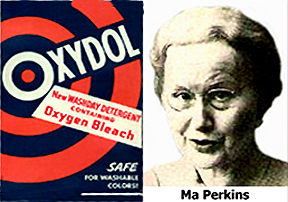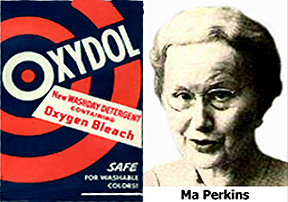No program was so enduring to the hearts of area housewives in the 1940s and 1950s, as was “Ma Perkins,” a quarter-hour “soap opera” broadcast over radio station WJHL every weekday afternoon at 1:15.

Each segment opened with these memorable words: “And now … Oxydol's own Ma Perkins,” followed by an organ theme song, appropriately titled “Ma Perkins,” a slight variation of “My Old Kentucky Home.”
Our small apartment radio never missed an episode; my mom was an ardent fan of the widow Ma and her simplistic radio gang – John, Evey, Fay, Willie, Junior and Shuffle. Over time, some 68 unique characters were introduced over this much-listened-to radio production. Being a child, I was less ecstatic about the popular program, but usually listened inattentively to the story plots due to the smallness of our apartment.
Virginia Payne assumed the title role of Ma, a pleasant soft-spoken lady, who was co-owner of a lumber company in the fictitious town of Rushville Center. The series began in 1933 over NBC radio with the 23-year old Payne sustaining the title role for an amazing 27 years, without missing a single broadcast. Ma’s distinctive motherly voice preserved her longevity over the entire series; she could be heard by radio listeners but not seen. The nifty actress would later become affectionately known as Oxidol’s “Mother of the Air.”
Over the golden years of radio, more than 50 radio “soaps” floated across the radio stage including: “One Man's Family” (dedicated to the mothers and fathers of the younger generation and to their bewildering offspring), “The Romance of Helen Trent” (just because a woman is 35 or more, romance in life need not be over), “Stella Dallas” (the true-to-life story of mother love and sacrifice), “Portia Faces Life” (reflecting the courage, spirit and integrity of American women everywhere) and “When A Girl Marries” (dedicated to everyone who has ever been in love).
These shows were aimed primarily at working housewives, allowing them to concurrently perform their routine domestic chores while listening to their radios. These weekday serialized melodramas were so-named because their sponsors generally sold cleansing products – soaps, detergents, cleaning agents and toothpaste. Unlike modern day television soaps, the story lines were as squeaky clean as the products they advertised, with plots focusing predominantly on didactic family values.
The mild mannered Ma was a homespun philosopher, always ready to dispense needed guidance on sundry issues to her family members and friends. Her life emulated the Golden Rule. Since the programs were only 15 minutes (including commercials), some scenes took weeks to fully develop as if being broadcast in slow motion.
Radio began to transform heavily by 1960, as TV became the dominating medium. Sadly, Ma and her gang ran out of soapsuds on November 25, 1960 after 7065 broadcasts. Another popular soap, Young Doctor Malone, performed its last operation that same afternoon. On the last show, Ma spoke resolutely to her tearful radio audience, telling them goodbye and assuring them that the characters they had grown to know and love would “live happily ever after.”
Virginia Paine parted the airways forever with these final words: “Goodbye and may God bless you.” With that, the lumber company co-owner and her group closed their factory and faded into radio history.

Comments are closed.